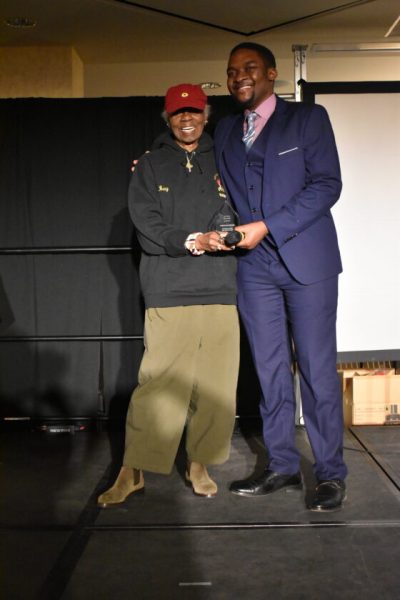
Master’s student Bester Mangisoni (data science), president of the African Students Organization at Michigan Tech, was quoted by the Daily Mining Gazette in a story about African Night, an annual event hosted by the org on March 9, 2024, to share their cultures with the community. This year’s event featured speakers Josh Rushlau and Betty Chavis. Read the article below.
Published March 11, 2024. By Garrett Neese, Staff Writer, Daily Mining Gazette
Read the original article here.
HOUGHTON — African students at Michigan Technological University shared their cultures with the community through food, performances and historical presentations at Saturday’s African Night.
The African Students Organization, which organizes the event each year, has a mission of promoting African culture. Fourteen African countries have students currently enrolled at Tech.
While the group also has internal events throughout the year, Saturday’s dinner is the main outreach to the community, said Bester Mangisoni, the group’s president.
“We like to have something like this where we can invite the community to try African food, appreciate our music, our dances, and so on. This is one of our iconic events.”
Guests filled their plates with jollof rice, chapati, semo dumplings and other food from around the continent.
As they ate, they cheered on a series of energetic performances. The ASO Dance Team and other students showcased their moves. And musicians drew on songs from through the African diaspora, whether by Ghanian rapper Black Sherif, Bob Marley, Louis Armstrong or Rihanna.
After dinner was cleared away at the end of the event, students kept the celebration going with a dance.
This year’s guest speaker, Joe Rushlau, serves as development director at St. Albert the Great Parish. His 28 years in the Air Force as a maintenance and logistics officer included postings around the world.
Speaking to a room of engineers, he used the metaphor of concrete. Without the binding agent of water, it’s just a disparate collection of stones, rocks, clay and sand.
“You brought in even more ideas, even more differences, even more culture, to your mix of what you might call cultural concrete,” he said. “… Accept those differences, use the connections you have with people at Michigan Tech, another connection you have, another experience in common, to build community wherever you may be in the world.”
As one example, he used the example of an Air Force trip to Ghana. When his group’s car was stuck in traffic on the national highway trying to get back to the U.S. Embassy, they encountered a Ghanian police officer. He told them, “Follow me.”
Darting through oncoming traffic, the officer got them to their meeting.
“Our common bond that we had with that man of duty and service allowed us to connect quickly, and he helped us fulfill our mission,” he said. “Even though we’re from different cultures, even though we were from different countries, he helped us.”
Members also gave brief presentations about African countries. The new knowledge came back as a quiz at the end. (The most populated country? Nigeria.)
Also speaking Saturday was Betty Chavis, who became the group’s first advisor when it formed in 1989. At the time, there had only been about 45 African students at Tech.
She is pleased to see the ASO flourishing.
“It’s good to see so many faces from all the different countries, and I know the food’s going to be fabulous as well,” she said. “And I’d just like to welcome all of you that are here from the various countries. We’re all brothers and sisters, you know that. And when you look below the skin, we all bleed the same color. So it means we have hands across the rivers and the lakes and the oceans, makes us all connected.”
Rushlau and Chavis also helped present awards to ASO and community members who have helped the group spread its message to the campus and surrounding area.
The number of African students has been growing at Tech. For the 2023-24 year, Northern Africa is one of the fastest-growing areas of graduate student applications.
The larger African community also makes it easier for students to find each other and help, whether with finding a place to stay or advising on what clothes are needed to get them through a Michigan winter.
Mangisoni hadn’t known what to do when he arrived at Tech. When he posted on the Facebook page for Tech’s Daniell Heights apartments looking for help with accommodations, the previous president of ASO reached out to him and introduced him to the rest of the group.
“Last year, and now with us, we try to carry on that spirit of getting in touch with the African students who are coming in, help them with transportation, show them the way around,” he said. “People coming in December, most of us don’t really understand what you mean when you say ‘It’s cold here.’”
The group is also looking at ways to reach out beyond African Night, possibly by visiting local schools.
“The best we can do is have this event, and fortunately, it’s popular, and pulls in some of the community,” he said. “But I wish we could do more.”